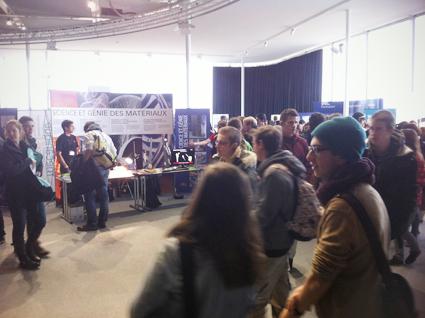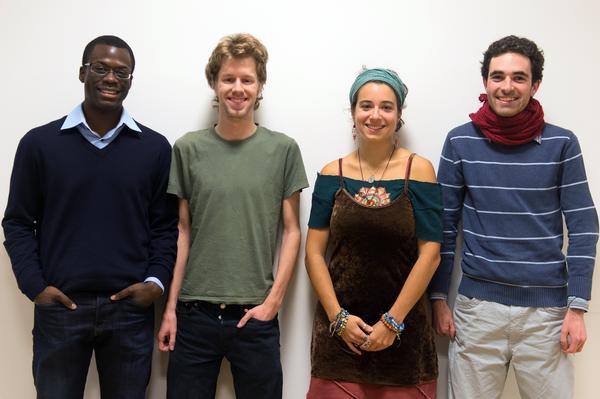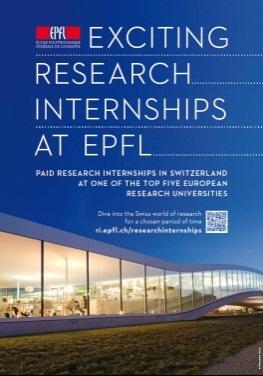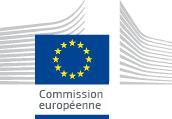Education Office Newsletter - December 2013

© ch.photos.com
The end of this year was graced with a generous, brilliant autumn. Before the rush of year-end festivities, the time has come to bring you the latest news in Educational Affairs. The DAF takes this opportunity to thank everyone contributing to education as well as its faithful readers for their cooperation and interest in our work. With our very best Season’s Greetings, we wish you a happy and fruitful 2014.
Albertine Kolendowska
Contents
- Human Ressources
- IS-Academia
- Statistics Observatory
- Accreditation
- 300 high-school students visit EPFL in German and Italian
- Four Students Receive the Durabilis Award
- Association News
- Selection of talented students from internationally acclaimed universities for research internships
- Swiss - Kyoto Symposium in Zurich
- Brussels Gives Green Light to Europe2020
Human Ressources
In mid-November Ms Mirjana Rittmeyer joined the Education Office as Head of Special Projects. Her work mainly revolves around premises for teaching including, for instance, detailed specifications for the future Teaching Bridge satellites under the leadership of project manager Pascal Vuilliomenet, as well as overall monitoring of requirements for teaching facilities in cooperation with the Real Estate & Infrastructure Department.
We extend a warm welcome to Ms Rittmeyer. Please do not hesitate to contact her with any specific requirements in this field.
Next March, Cédric Junillon, Deputy to the Head of the Registrar’s Office, will leave this position to join the HES-SO in Yverdon. We wish to extend our heartfelt thanks for his eight years of service in the Registrar’s Office and wish him every success in his future career. The position is open – please look at the job description on http://emploi.epfl.ch/page-102412-fr.html.
IS-Academia
The dedicated portal for the management of doctoral studies is online. Since early October, PhD students have access to the IS-Academia (ISA) portal dedicated to PhD study administration. This extension will start with a one-year transitional period during which the former ISA access will remain valid, along with the new portal.
Available in both English and French, the portal retains former features while offering numerous benefits: the relevant data and functions are grouped under thematic tabs and the display is more user-friendly. For example, PhD students may rapidly find out their weekly schedule (as a PhD student or doctoral assistant), enlist for further courses while managing potential clashes, check their personal data and addresses managed under ISA or manage their assistant profile or completion of their thesis.
As for master projects, systematic detection of plagiarism is being introduced. Students will have to upload their document into IS-Academia to be checked via the online platform iThenticate. An originality score will be calculated based on a wide repository of documents published on Internet as well as publishers’ databases. The resulting score will be available in IS-Academia, giving the Sections and project managers a further tool to identify contentious cases. Confidential projects will not be subject to this check. In a second stage, it is foreseen that the same principle will be introduced for theses.
For further information: [email protected]
Statistics Observatory
The traditional educational statistics dashboards were submitted to the senior management on 9 December. The official student numbers as at 1 November 2013 show that we have 9'868 registered students, including PhD students, i.e. an increase of 6% in relation to last year. The student population is broken down into 5,187 Bachelor students (up 5.9% from 2012), including 1,563 new students (+ 1.5%), 2,340 Master students (+ 9.9%) and 2,058 PhD students (+0.8%). The number of applicants is also higher than in 2012 with an increase of 1.5% for CMS/Bachelor courses (2,905 applications), 6.9% for Master courses (2,035 applications) and 8% for PhD courses (3,424 applications).
The success rate in the foundation year was 49.1%, which remains fairly stable around 50%. Note that by taking into account those who repeat the year, a little under 70% of students actually pass the preparatory exam. As observed in previous years, students from the physics & applied mathematics stream (PAM) or with added maths training are more successful than their fellow students from other educational tracks. Students having completed the CMS have the highest pass rate in the preparatory exam (over 75%). As in previous years, the Federal Academic Baccalaureate (maturité fédérale) remains an insufficient basis to ensure easy access to EPFL, with 32% success in the preparatory cycle. These figures are a perfect illustration of the major importance of the foundation year as a filter, in order to subsequently ensure very low final failure rates in the Bachelor and Master cycles. Final student numbers for the new academic year can be viewed on http://ogif.epfl.ch/stat_effectifs.
Additionally, this period provides an analysis of the previous year’s teaching loads, which shows that on average, a full professor delivers 3 courses (lecture/exercises) and one lab carrying 2 credits to 50 students, for example. The same professor typically supervises 3 master projects and 8 PhD students.
Finally, the education statistics team is currently developing a number of forecasts to assist the Sections and Registrar’s Office in their management. The increase in first-year student numbers affects subsequent years and gives rise to logistic and supervision issues.
For further information: [email protected]
Accreditation
EPFL is preparing for renewal of the dual accreditation obtained in 2007 from the Swiss Center of Accreditation and Quality Assurance in Higher Education (OAQ - www.oaq.ch) and the French Commission des Titres d'Ingénieur (CTI - http://www.cti-commission.fr).
The EPFL Quality Assurance system, which covers the whole range of EPFL activities, will be assessed from 24 to 27 November 2014 by a committee of (less than ten) international experts appointed by these two agencies. To this end EPFL will draw up a self-evaluation report (in English) in response to a joint quality standard shared by both agencies. One of the new aspects in preparing for the process will be the introduction of learning outcomes in course and programme descriptions. The self- evaluation report will be split into two parts – the first regarding the overall operation of EPFL (about 70 pages) and the second with contributions for each Bachelor/Master curriculum, to be provided by each Section Director and approved by the relevant School Dean (about 10 pages per Section, without attachments).
Contributions by the Sections are expected by the second half of April 2014 and a draft version of the self-evaluation document will be issued for consultation in the following month. The final version of the report will be presented to the EPFL Direction in its first session of August 2014, for submission to both agencies in early September.
The Quality Assurance unit and the CAPE will actively support the Sections in drawing up the self-evaluation report. The day-to-day management of this project is entrusted to a firm and overseen by a steering committee chaired by the Dean of Bachelor/Master studies. The committee includes representatives of all EPFL community groups.
For further information: [email protected] or [email protected]
300 high-school students visit EPFL in German and Italian
German- and Italian-speaking high school students came to EPFL on the 4th of December for an information day tailored for them by the study programs promotion service.

The number of participants turned out to be significantly higher than last years, showing a growing interest in EPFL from non-French speaking regions of Switzerland.
At the Rolex Forum, visitors got the chance to pass by booths from all sections, and later participated in 2 different activities in their respective fields of interest. Swiss-German and Swiss-Italian EPFL students were guiding the participants through the day, answering all their specific questions.
A students' population where all Swiss cultures are represented is a very important dimension of EPFL. This information day is therefore a key event for putting forward the attractiveness of the campus and how students enjoy studying here. This day was made a success with the energy invested by the sections and the wonderful enthusiasm shown by all students representing EPFL on this occasion.
Read more: [email protected]
Four Students Receive the Durabilis Award
For the 2013 edition the jury decided to reward 4 projects, as excellent as they are varied:
The four prize-winners: Réginald Destinobles, UNIL; David Pascal Müller, EPFL; Emilie Crittin, UNIL; Michka Mélo, EPFL / Félix©Imhof
“Bikeability. Environnement cycliste et pratique du vélo” by Réginald Destinobles (UNIL). The project aims to highlight the benefits of cycling as a sustainable means of transport.
“Habitat bioclimatique alpin” by David-Pascal Müller (EPFL). This master project in architecture outlines a new form of Alpine habitat which fully integrates the requirements of sustainable development.
“La valorisation des eaux usées: pratiques et représentations relatives à l'eau, à l'eau usée et aux combustibles de cuisine dans une communauté rurale sahélienne sénégalaise” by Emilie Crittin (UNIL). This project aims to optimise the use of existing water resources in the village of Ndem in Senegal so as to reduce human pressure on the environment in an attempt to improve the socio-economic situation of the local population.
“Le biomimétisme nous mène-t-il au développement durable ?” by Michka Mélo (EPFL). Using the example of an electric kettle, this project proposes a systematic method of eco-design through biomimetics.
For further information: [email protected] ; http://developpement-durable.epfl.ch/durabilis/laureats2013
Association News
The series of lectures for student associations ended on 4 December last. The students followed various courses on such themes as accounting, interpersonal communications and communications via social networks. Further to the first edition of courses organised in 2012, the content had been improved and the evaluations received have shown that this support is extremely useful to students involved in association activities.
Moreover, 4 new student associations were founded during this term: the EPFL Photonics Chapter aims to promote the field of photonics at EPFL; Of@CampusLausanne groups the officers of the Lausanne University campus; AEGC is the civil engineering student association, and Hackers@EPFL promotes the culture of ethical hacking. It should be noted that a fifth association, the Student Chamber Orchestra, will be shortly acknowledged and is already active on campus.
For further information: Magali Favre, in charge of student associations, Educational Affairs
Selection of talented students from internationally acclaimed universities for research internships
The International Relations Unit has announced in September the launch of its flexible internship program at EPFL for students from internationally acclaimed universities to increase EPFL's visibility and to regulate student exchange flows. Within one month, 500 students have submitted their application and are currently being reviewed by professors who would like to hire them. Five excellent students have already been accepted from MIT, McGill University, Georgia Tech and CMU. Successful and selected students obtain a scholarship which enables them to cover the main costs of living as well as part of the travelling expenses. These costs are being shared between the laboratory which accepts the students and the International Relations Unit. Students are also being offered the possibility to undertake a semester exchange program before or after the research internship.
For further information: http://ri.epfl.ch/researchinternships or [email protected]
Swiss - Kyoto Symposium in Zurich
In 2014, Japan and Switzerland will celebrate the 150th anniversary of their diplomatic relations. The first in a series of commemorative events was held in Zurich on 21 and 22 November in the form of a multidisciplinary symposium.
The proposed workshops spread across two days between Zurich University and ETHZ brought together 120 participants from Japan and 220 from Switzerland, among whom several EPFL professors and scientists. Professor Karl Aberer, Acting Provost and Vice President for Information Systems, represented EPFL at this symposium and delivered several addresses which caught the attention of the Japanese participants.
The scientists took this opportunity to exchange their latest research findings and steer their future research themes. Many appointments were made between Swiss and Japanese researchers in the prospect of further developing exchange and collaboration.
EPFL has initiated talks with a view to a general cooperation agreement with the University of Kyoto to replace a sector-based MoU. Student exchange projects are also being discussed.
For further information: Marius Burgat, International Relations, [email protected]
Brussels Gives Green Light to Europe2020  After more than two years of negotiations, the European Parliament finally adopted the Multiannual Financial Framework (MFF) on 19 November, which essentially means the go-ahead to the Erasmus+ (education and training) and Horizon2020 (research and innovation) programmes. These may now start on 1 January 2014. The budget allocated to research and innovation has increased by 30% (a total of € 79 billion) and that devoted to education by 40% (€ 14.7 billion) in relation to earlier programmes (respectively FP7 and Erasmus).
After more than two years of negotiations, the European Parliament finally adopted the Multiannual Financial Framework (MFF) on 19 November, which essentially means the go-ahead to the Erasmus+ (education and training) and Horizon2020 (research and innovation) programmes. These may now start on 1 January 2014. The budget allocated to research and innovation has increased by 30% (a total of € 79 billion) and that devoted to education by 40% (€ 14.7 billion) in relation to earlier programmes (respectively FP7 and Erasmus).
A first call for proposals for Horizon 2020 will be launched in mid-December, and the first call in the framework of Erasmus+ should be initiated before end of December.
Switzerland is fully involved in these programmes subject, however, to the upholding of the bilateral agreements.
For further information: International Relations: [email protected]